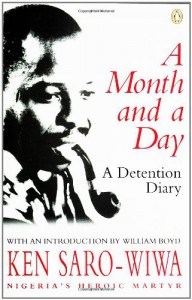

In May 1994, Ken Saro-Wiwa, together with eight others, was arrested in Nigeria for the murder of four men who had been killed during a riot following a political rally. Though there was overwhelming evidence of his innocence, Saro-Wiwa was imprisoned for eighteen months. He and his co-defendants were eventually found guilty in a show trial and sentenced to be hanged. Despite massive international publicity and outcries against the mockery of justice these acts represented, on November 10, 1995, the executions were carried out. A Month & A Day is the moving last memoir of the man who gave voice to the campaign for the basic rights of the Ogoni people of Nigeria. Saro-Wiwa was an outspoken critic of the despotic Nigerian military regime and of the international oil companies, notably Shell, which he held responsible for the destruction of his homeland. Yet, despite the brutal government campaign against the Ogoni, he always advocated peaceful and non-violent protest. The book is framed by Saro-Wiwa's account of an earlier effort to silence him, when he was arrested in mid-1993. He lays out both the experience of detention and the story of his involvement with the Ogoni cause. He was eventually released as a result of intense international pressure, only to be arrested again the next year, shortly after finishing this book; he remained in prison until his death.
~from back cover
Ken Saro-Wiwa, a member himself of the Ogoni community he dedicated his life to defending, was a Nigerian activist, author, college professor, successful tv writer / producer. Additionally, he held various Nigerian government positions at one time or another, such as Commissioner of the Land / Transport / Education Departments. He turned to writing professionally in the 1980s.
Regarding his activism, Saro-Wiwa was outspoken critic of the Nigerian military (at least of those in charge of it anyway). He also protested the foreign oil companies, primarily Shell, whose search for oil across Ogoni lands ended up ruining the lush landscape that once was -- waterways polluted, acid rain polluted crops, oil spills not being cleaned up. Saro-Wiwa states that since 1958, when the first oil companies started drilling on Ogoni lands, an estimated 30 BILLION dollars in oil has been pulled from the ground, yet Ogoni people were given NOTHING in return. At the time of Saro-Wiwa writing this, much of the area was still without electricity or modern plumbing. The Ogoni people were given no representation in Nigerian government, little to no job opportunities or government assistance, no educational opportunities or health coverage, and even Shell was declining to hire locals! The Ogoni people were suffering food and land shortages because the oil companies were snatching it all up for oil drilling, so the community struggled to find ways to keep their families fed. Desperate for help, the Ogoni people attempted to get outside assistance. The response? Greenpeace flat out told them no, basically saying that what they needed didn't fall under Greenpeace's wheelhouse... and Amnesty International said they could only help if someone was in prison or citizens were being massacred.
Wiwa served as president of the organization MOSOP (Movement for the Survival of the Ogoni People). When four men were killed during a political rally Saro-Wiwa was known to be against, he along with eight others were charged with the crime. Though there was a mountain of evidence proclaiming his innocence, he was still sentenced to death and hanged in 1995.
Saro-Wiwa mentions in his foreword, dated July 1994 (he would be executed the following November), that he had completed the manuscript for this book shortly before being arrested the final time (he later points out in the diary's pages that between 1993-94, he was arrested a total of four times in three months). He had someone sneak the manuscript into him while he was imprisoned, working feverishly to complete the final edit. In these pages you read what his activism work entailed and why he believed he was being targeted. Describing the arrest he opens his story with, he mentions that it didn't take him long to suspect that something fishy was going on, but he feared that if he attempted an escape his actions might bring down more unnecessary violence onto the Ogoni people, what it might mean for the people who relied on his protection... so for their safety, he chose to go along with it all and allow himself to be placed in prison.
I have to put my hat in with the other reviews I've read that say the strength in this book lies in the message / topic, not so much in the writing style itself. While I feel like I learned a lot about this time period and at times definitely felt incensed over what the Ogoni people were put through, Saro-Wiwa's writing itself left something to be desired. Admittedly, he was under some hardcore duress, so I don't want to rate him too harshly... yet I'm not going to pad my rating simply due to circumstance. I'm sticking with my honest opinion here -- his story is an important one but the writing itself is just okay. The early pages of the diary read like a police incident report more than anything, but I will say as the story goes on, I noticed the tone got a little more relaxed and I started to get a bit better sense of Saro-Wiwa as an individual and the passion for his work began to shine through a bit better.

 2
2








